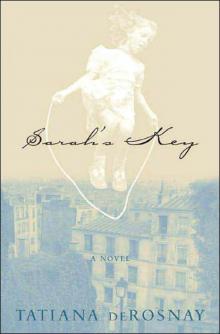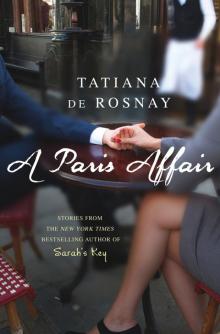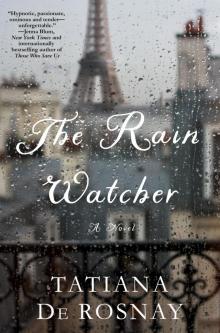- Home
- Tatiana de Rosnay
A Secret Kept Page 5
A Secret Kept Read online
Page 5
"Does Margaux still see Pauline?" asked Melanie.
"Yes, of course. But Pauline is the exception. They've been in the same school since they were six years old. You wouldn't recognize Pauline."
"Why?"
"Pauline has the figure of Marilyn Monroe."
"Are you kidding? Skinny little Pauline with her buck teeth and freckles?"
"The very same skinny little Pauline."
"My God," said Melanie, awed. Then she put out her hand and patted his gently. "You're doing fine, Antoine. I'm proud of you. Must be a heck of a job raising two teenagers."
He felt his eyes going wet. He hurriedly stood up.
"What about a morning dip?" He smiled down at her.
After their swim and, later, lunch, Melanie went up to her room to finish reading a manuscript and Antoine decided to go rest in the shade. The heat was less fierce than he had expected, but he would probably end up in the pool at one point, he guessed. He installed himself on the terrace in a wooden deck chair beneath the large parasol and tried to read a couple of pages of a novel Melanie had given him. One of her star authors--a brash young man, barely twenty, with peroxide hair and an attitude. Antoine's interest soon waned.
Around the pool, families came and went. It was far more amusing watching them. There were a couple of forty-year-olds who could have been Astrid and him, he mused. The guy was in fine shape, tight abdomen and muscular arms, but she was not as good, running to fat. Their two teenagers were the exact replica of his. The girl had a perpetual moue, earphones screwed in tight, and black nail polish. The boy, younger, more like Lucas, he decided, was enthralled by a Nintendo. When their parents spoke to them, they were answered by shrugs and grunts. Welcome to the club, thought Antoine. But at least this couple were in it together. They were a team. They could deal with the oncoming storms. He had to face the storms alone.
When was the last time he had a conversation with Astrid about their kids? He couldn't remember. And what were they like with her, with Serge? Were they just as bad? Worse? Better? How did she cope with it? Did she ever lose her temper? Scream back? And what about Serge? How did he deal with three children who weren't even his own?
Antoine noticed another family, younger, with their toddlers. Late twenties, early thirties, two small children. The mother sat with the little girl on the grass, patiently helping her daughter to put a large plastic puzzle together. Every time the girl got it right, her mother clapped and cooed. He used to do that too, he remembered. That blissful period when children were small and sweet. You could hug them and tickle them. Play hide-and-seek. Play the monster. Run after them, scoop them up in your arms, swing them over your shoulder. Their shrieks and screams in your ears. You could sing them to sleep and gaze at them for hours, marveling at the perfection of their features.
He watched the father giving the baby a bottle, cautiously tying the bib, fitting the rubber nipple into his son's mouth. He felt overwhelmed by sadness, for what was gone and no longer, for a cherished time in his life when Astrid and he were still going strong, when he enjoyed his job, felt he was doing well, felt at peace with himself, felt young. He remembered walking through Malakoff with his family on Sunday mornings at the market, Lucas still in the stroller pushed by Astrid, and the other two sauntering along, their hot, sticky hands in his. The neighbors, the shopkeepers would wave and nod. He had felt so proud. So secure in his own world. As if nothing could ever destroy it. As if nothing would ever change.
When did it all start? He hadn't seen it coming. And if he had, if he had been warned, would it have made all this easier? Was this about growing old? Was this what was in store for him now? He felt he could no longer bear the sight of the happy little family that reminded him of his past, so he got up, sucked in his stomach, and slithered down into the pool. The cool water did him good, and he swam laps for a while, till his arms and legs ached and he felt breathless. He went back to his chair and spread his towel over the lawn.
The sun beat down on him, fierce and strong. Just what he needed. The intoxicating smell of roses floated over to his nostrils, and with a pang he remembered having afternoon tea with his grandparents on this very lawn, by the roses. He recalled the slim, spongy madeleines he would dip into his milky Darjeeling, the acrid smoke from his grandfather's cigarette, his grandmother's velvety, soprano-like intonations, his aunt's abrupt, hoarse laughter. And he remembered his mother and her smile, and the way her eyes lit up when she looked at her children.
Gone. All gone. He wondered what the year ahead would bring. And how he could possibly shake off this overpowering sadness. Never had he felt it more intensely than since his return to Noirmoutier. He could travel. He could take time off and go somewhere very far away, somewhere he had not been back to for years--China or India. But the thought of doing that alone put him off. He could ask one of his close friends, Helene or Emmanuel or Didier. Nonsense. Who could take off a couple of weeks or a month in this day and age? Helene was mother to three demanding children. Emmanuel worked in advertising and had the worst hours ever. Didier was a fellow architect and never seemed to stop working. Nobody could rush off to Asia at the drop of a hat.
Tomorrow was Melanie's birthday. He had made reservations at one of the best restaurants in Noirmoutier, L'Hostellerie du Chateau. One they had never been to, not even in the heyday of Blanche and Robert.
As he turned from his back to his stomach, he thought of the week ahead. People coming back to town after their vacation. Visions of bronzed faces in Parisian streets. The workload he had to face. The new assistant he had to find. The children starting school again. August slipping into September. And how on earth was he going to face another winter on his own?
During that terrible storm on the little one's birthday I was afraid, as usual, but while they were all huddled in the candlelit dining room, you came to me in the dark, my love. The lights had gone out, but we did not need them. Your hands were like beams shining into me, glaring into me, almost white with their passion, and you took me to yet another level, where I had never been before, where my husband had never taken me, no one, do you hear, no one. I went back to them when the lights went on, and the cake came. I went back to my role as perfect wife and mother, but I was shining with your desire, coated with it, and she looked at me again, as if she suspected something, as if she knew. Listen, I am not afraid. I am not afraid of them anymore. I know that soon I will have to leave, go back to Paris, resume my everyday life, the avenue Kleber and its quiet, well-to-do atmosphere, the children . . .
I talk to you too much about my children, don't I? But they are my little treasures. They mean the world to me. You know that expression, the apple of her eye? That's what they are, my precious little angels, the apples of my eye. If life is to be with you, which is what I want more than anything else in the world, my love, then life is to be with you and them. The four of us. Like a little family. But is that at all possible? Is it?
My husband has canceled his trip here this weekend. Which means you can come to my room again, in the dead of the night. I shall be waiting. It gives me shivers, just imagining what you are going to do to me and how I shall take you.
Destroy this.
His sister was stunning tonight, her hair swept back, held by a black bow, her slender figure outlined by a simple black dress. His mother looking straight out at him from her eyes. But he didn't tell her. That was his own private memory. He was pleased about the choice of the restaurant. A stone's throw from Noirmoutier castle, it had looked deceptively simple from the outside, with its narrow porch and olive green shutters. The main room was vast, with a high, pointed ceiling, cream-colored walls, wooden tables, and a large fireplace, but he had reserved outside, on the small, intimate tented terrasse, where their table awaited them beneath a fragrant fig tree growing against a crumbling wall. There were no noisy families here, he noted, no squealing babies, no temperamental teenagers. The perfect place to celebrate Melanie's fortieth birthday. He ordered two flutes o
f rose champagne, her favorite, and they quietly looked over the menu.
Foie gras poele au vinaigre de framboises et au melon.
Huitres chaudes au caviar d'Aquitaine et a la creme de poireaux.
Homard bleu a l'Armagnac.
Turbot de pleine mer sur galette de pommes de terre ailees.
"This is really nice, Tonio," Melanie said finally when they had clicked their glasses together. "Thank you."
He smiled. This was exactly what he had in mind when he planned this trip a couple of months ago.
"So how does it feel being forty?"
She grimaced. "Awful. Hate it."
She gulped down her champagne.
"You look pretty damn good for forty, Mel."
She shrugged. "Doesn't make me any less lonely, Tonio."
"Maybe this year . . ."
She sneered. "Yeah, maybe this year. Maybe this year I'll meet a nice guy. I say that each year. The problem is, as we all know, guys my age aren't looking for forty-year-old women. Either they're divorced and they want a younger wife, or they're single--which makes them even more suspicious--and they also shy away from women their age."
He smiled.
"Well, I'm not into younger women. I've had my share of those. All they want to do is go to nightclubs, go shopping, or get married."
"Aha," she said. "Get married. That's the core of the problem. Can you explain to me why nobody wants to marry me? Am I going to end up like Solange? A fat, bossy old lady?"
Her green eyes teared up. He couldn't bear having the lovely evening spoiled by her sadness. He put down his cigarette and grabbed her wrist gently but firmly. Their orders came, and he paused till the waitress had left.
"Mel, you just haven't met the right guy. Olivier was a mistake, and it lasted too long. You were always hoping he'd propose. He never did, and I'm glad he didn't, as he would have been wrong for you. You know that."
She wiped her eyes slowly and smiled at him.
"Yes, I know that. He took six years of my life, and what a mess he left behind. I sometimes wonder if I'm in the right field to meet men. Maybe publishing is not the right place. A lot of writers and journalists are either gay or complicated and neurotic. And I'm fed up with having affairs with married men, like my horny old lover. Maybe I should come and work with you. You see men all day long, don't you?"
He laughed ironically. Yes, he did, he saw men all day long, and few women, actually. Men like Rabagny, who had so little charm it was almost unfair, men like the surly foremen he had to deal with constantly, with whom he sometimes had less patience than with his own children, men like the plumbers, carpenters, painters, and electricians he had known for years and whose crude jokes he had learned to put up with.
"You wouldn't like those kinds of men," he remarked, gulping down an oyster.
"How would you know? Try me! Take me to one of your building sites."
"All right, then." He grinned. "I'll introduce you to Regis Rabagny. Don't tell me I didn't warn you."
"Who the hell is Regis Rabagny?"
"The bane of my existence. A young, ambitious entrepreneur. He's bosom buddies with the mayor at the town hall in the twelfth arrondissement. Thinks he's God's gift to Parisian parents because he's created a line of avant-garde bilingual day-care centers. They're actually quite spectacular, but he's having a hard time getting them accepted by the safety board, and no matter how I try to tell him that we have to stick to rules and not take risks where children are involved, he won't listen to me. He thinks I don't understand his 'art,' his 'creations.' "
He was hoping to make Melanie laugh with a couple of witty examples concerning Rabagny's notorious tantrums, but he noticed that his sister was no longer listening to him. She was looking beyond his shoulder.
A couple had walked onto the terrace and were shown to a nearby table. A man and a woman in their fifties, tall, fantastically elegant. They both had silver hair--hers was whiter, his more salt-and-pepper--and tanned faces, the kind of tan that comes from sailing or riding, not just lying around on deck chairs. They were so astoundingly beautiful that a hush had come over the terrace. All the diners had turned to look at the couple. Impervious to the attention they were getting, they sat down, and soon champagne was on its way to them, brought by the waitress. Antoine and Melanie watched as they smiled at each other, made a toast, and clasped hands.
"Wow," said Melanie quietly.
"Beauty and harmony."
"True love."
"So it does exist."
Melanie leaned forward. "Maybe they're phonies. Just a couple of actors playing a part."
Antoine laughed. "You mean, to make us jealous?"
Her face lit up. "No! To make us hope. To make us believe it is possible."
His heart went out to her as she sat there in her black dress, clasping her champagne, the lovely line of her shoulders and arms etched against the fig tree in the background. There had to be a man, he thought, a good man, a nice, intelligent man, a man who could fall for a woman like Melanie. He didn't have to be as perfect as that man sitting at the next table, he didn't have to look half as handsome, but he could be strong and true and he could make her happy. He wondered where that man was right now. Thousands of miles away, or just around the corner? He could not bear the idea of Melanie growing old alone.
"What are you thinking about?" she said.
"I want you to be happy," he answered.
Her mouth twitched. "I want the same for you."
They sat in silence for a while and ate their meal, trying not to stare at the perfect couple.
At last she said, "You have to get over Astrid."
He sighed. "I don't know how to do that, Mel."
"I want you to, so much."
"I want to as well."
"I sometimes hate her for what she's done to you," she muttered.
He winced. "Don't. Don't hate her."
Melanie played with his lighter. She said, "I can't. You can't hate Astrid. It's impossible to hate Astrid."
How right she was. It was impossible to hate Astrid. Astrid was like sunshine. Her smile, her laugh, her perky walk, her chuckle, her singsong voice held light and movement. She hugged, she kissed, she crooned, she took your hand and held it tight, she was always there for her friends, for her family. You could call Astrid anytime. She would listen, nod her head, give advice, try to help. She never lost her temper, or if she did, it was for your own good.
The cake came, its candles lighting up the dusk. Everybody clapped, and the beautiful couple raised their champagne flutes to Melanie, as did all the other diners. Antoine smiled and clapped.
Behind his smile, the old pain was still there. It seared into him so precisely he nearly gasped. He had let Astrid go. He hadn't even realized she was slipping away. He had seen nothing coming. It had been like a head-on collision.
As they were having coffee and herbal tea, the chef came out to greet his guests table by table to ask whether they had enjoyed their meal. When he turned to them and saw Melanie in her black dress, he suddenly cried out, startling them. "Madame Rey!"
Melanie's face flushed scarlet. So did Antoine's. This sixty-year-old man clearly thought he was looking at Clarisse.
He snatched up Melanie's hand, kissed it rapturously.
"It has been such a long time, Madame Rey. Over thirty years, I'd say! But I've never forgotten you. Never! You used to dine here with your friends from the Hotel Saint-Pierre. It seems like merely yesterday. I was just starting out in those days."
There was a tight silence. The chef glanced from Melanie to Antoine, his eyes dancing. Then he slowly began to understand. He gently released her hand.
Melanie still said nothing, a small, embarrassed smile floating around her lips.
"Mon Dieu, what an old fool I am! You cannot be Madame Rey, you are far too young . . ."
Antoine cleared his throat.
"Yet you look so much like her . . . You can only be--"
"Her daughter," Mel
anie said at last, calmly. She smoothed down a lock of hair escaping from her ponytail.
"Her daughter! Of course! And you must be--"
"Her son," said Antoine laboriously, wishing this man would go away. He probably didn't even know their mother was dead. Antoine couldn't bear telling him. He hoped Melanie wouldn't say anything either, and she did not. She held her tongue as the man rambled on. Antoine concentrated on the bill and left a good tip. He and Melanie stood up to leave. The chef insisted on shaking their hands.
"Please give my respects to Madame Rey. Tell her how honored I am to meet her children, although her coming back to see me would be the most splendid surprise."
They both nodded, murmured their thanks, and fled.
"Do I look that much like her?" whispered Melanie.
"Well, yes. You do."
You have just left your room, and I am slipping this under your door, not leaving it in our usual hiding place, and I pray you get it before you catch your train back to Paris. I slept with your roses, and it was like sleeping with you. They are soft and precious, like your skin, like the secret places of your body where I love to go, those places that are mine now because I want to imprint myself upon them so that you may never forget me, never forget our time together, never forget how we met here last year, that first glance, that first smile, that first word, that first kiss. I am sure you are smiling as you read this, but I don't care, I don't care at all, because I know how strong our love is. You think sometimes I am young and very foolish. Soon we will find a way to face the world, you and I. Very soon.
Destroy this.
They sat together, shoulder to shoulder, watching the sea slide slowly over the Gois. Melanie spoke very little, her dark hair moving about in the wind, her face glum. She hadn't slept well, she explained when she came down for breakfast, and her eyes were small slits this morning, giving her an almost Asian appearance. He hadn't bothered about it at first, but as the morning drew on and she became more and more silent, drawn up in herself, he'd gently asked her if something was wrong, and she'd shrugged away his question. She had turned off her phone, he noticed, something she rarely did. She was usually riveted to it, constantly checking for text messages or missed calls. He wondered whether this had something to do with Olivier. Maybe he had telephoned her for her birthday or left a message, and had reopened the old wound. Clumsy bastard, he thought. Or was it the aging beau who'd forgotten to call her yesterday?

 A Secret Kept
A Secret Kept Sarah's Key
Sarah's Key A Paris Affair
A Paris Affair The Other Story
The Other Story The House I Loved
The House I Loved The Rain Watcher
The Rain Watcher